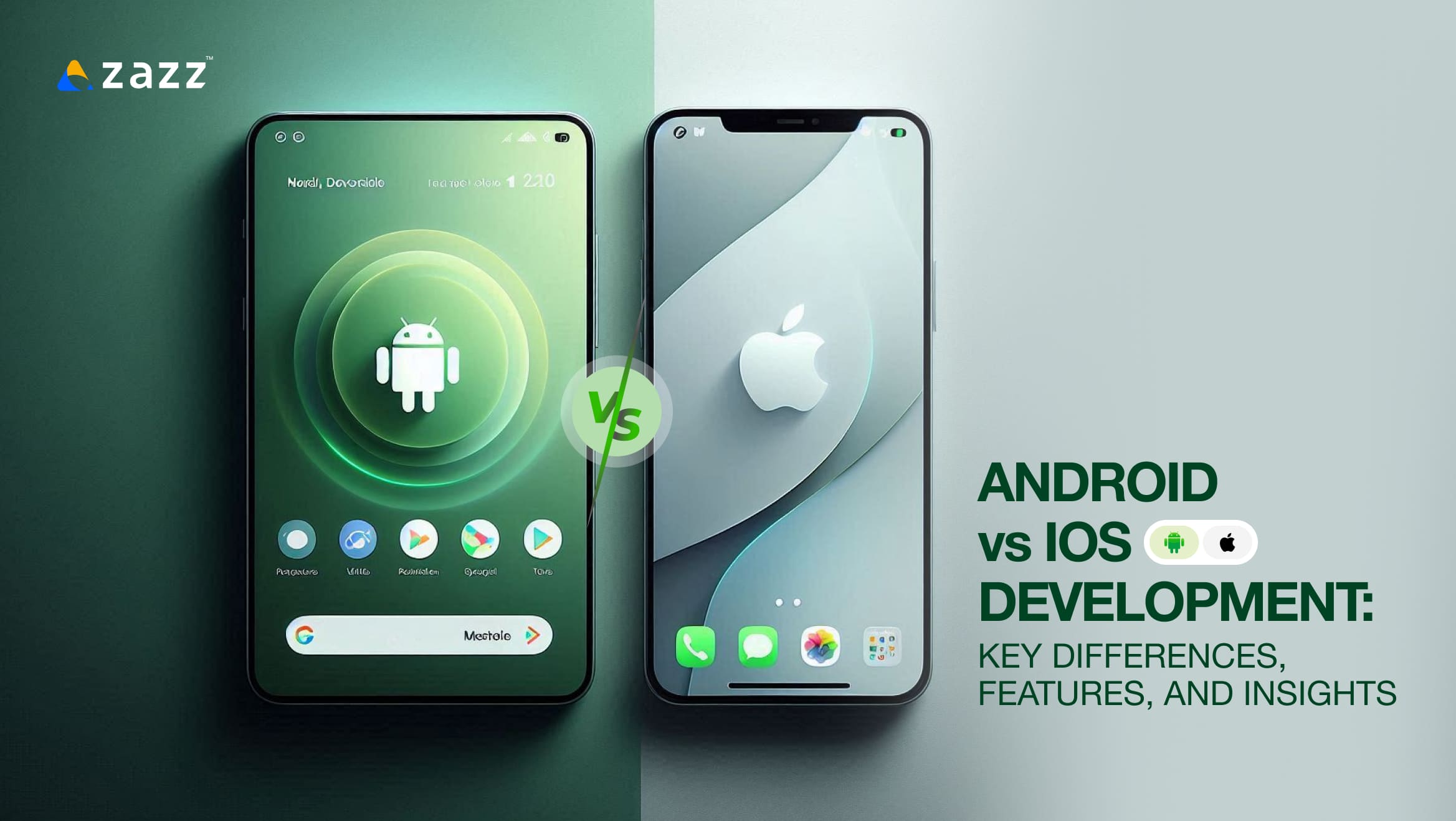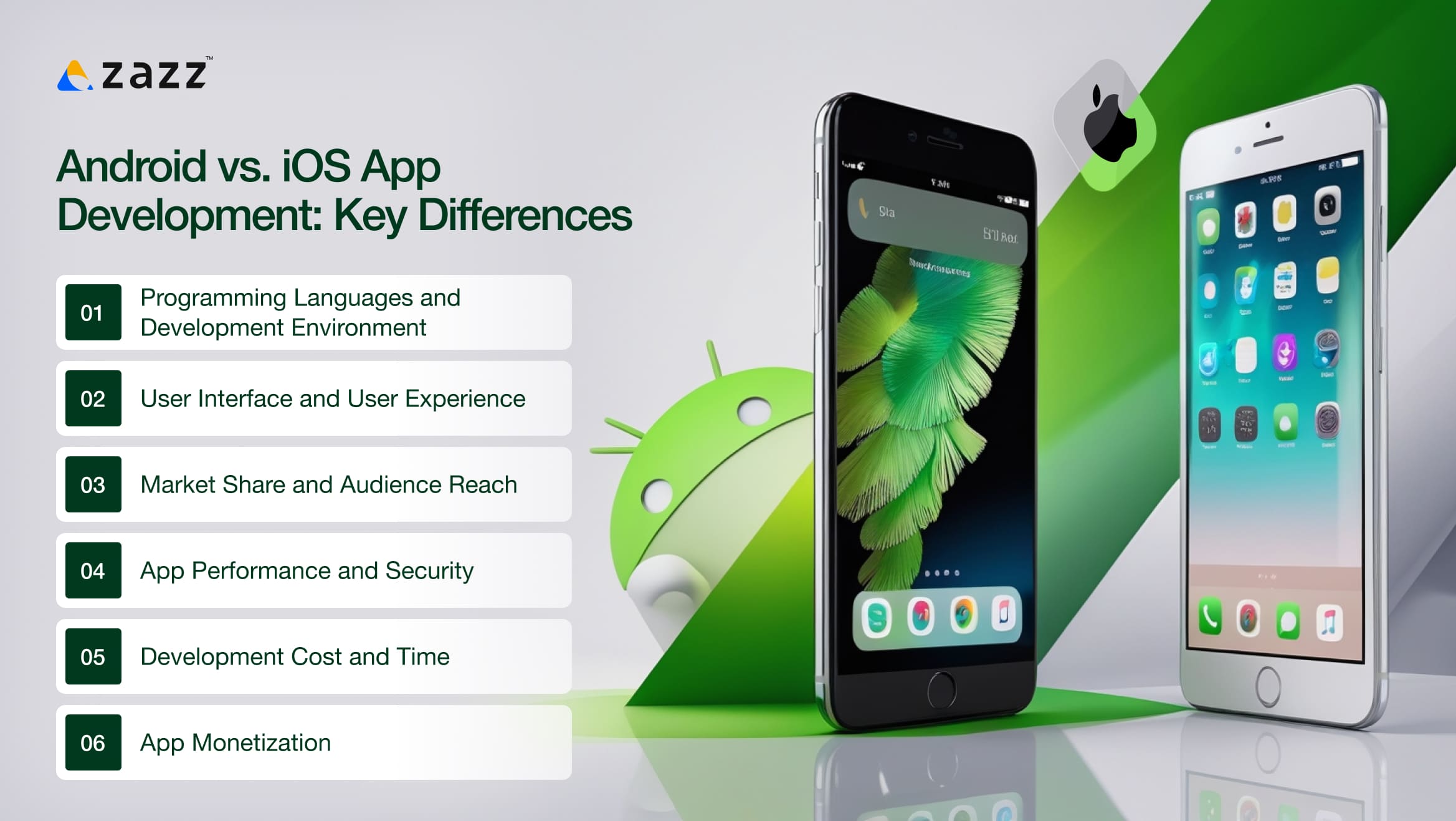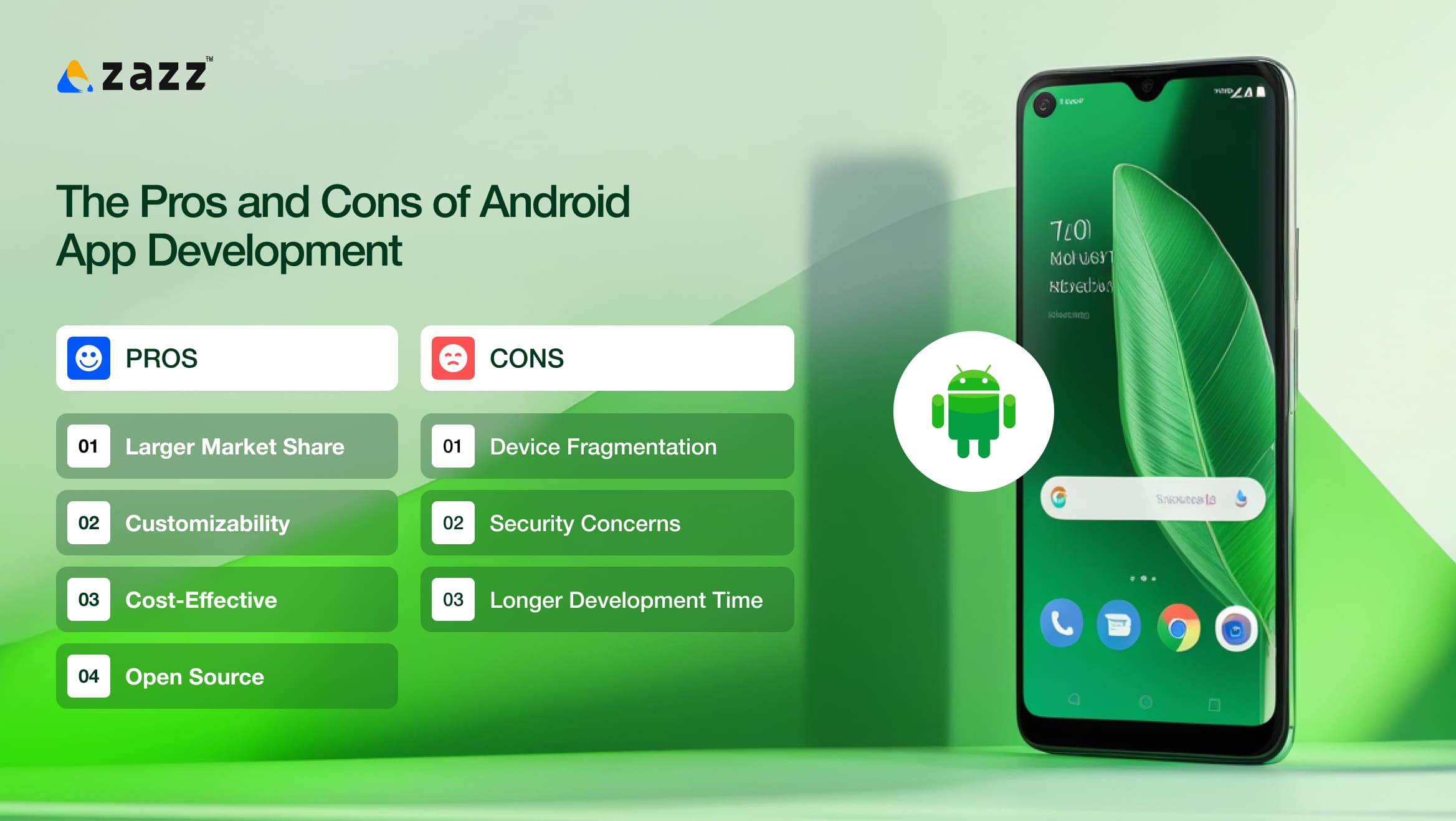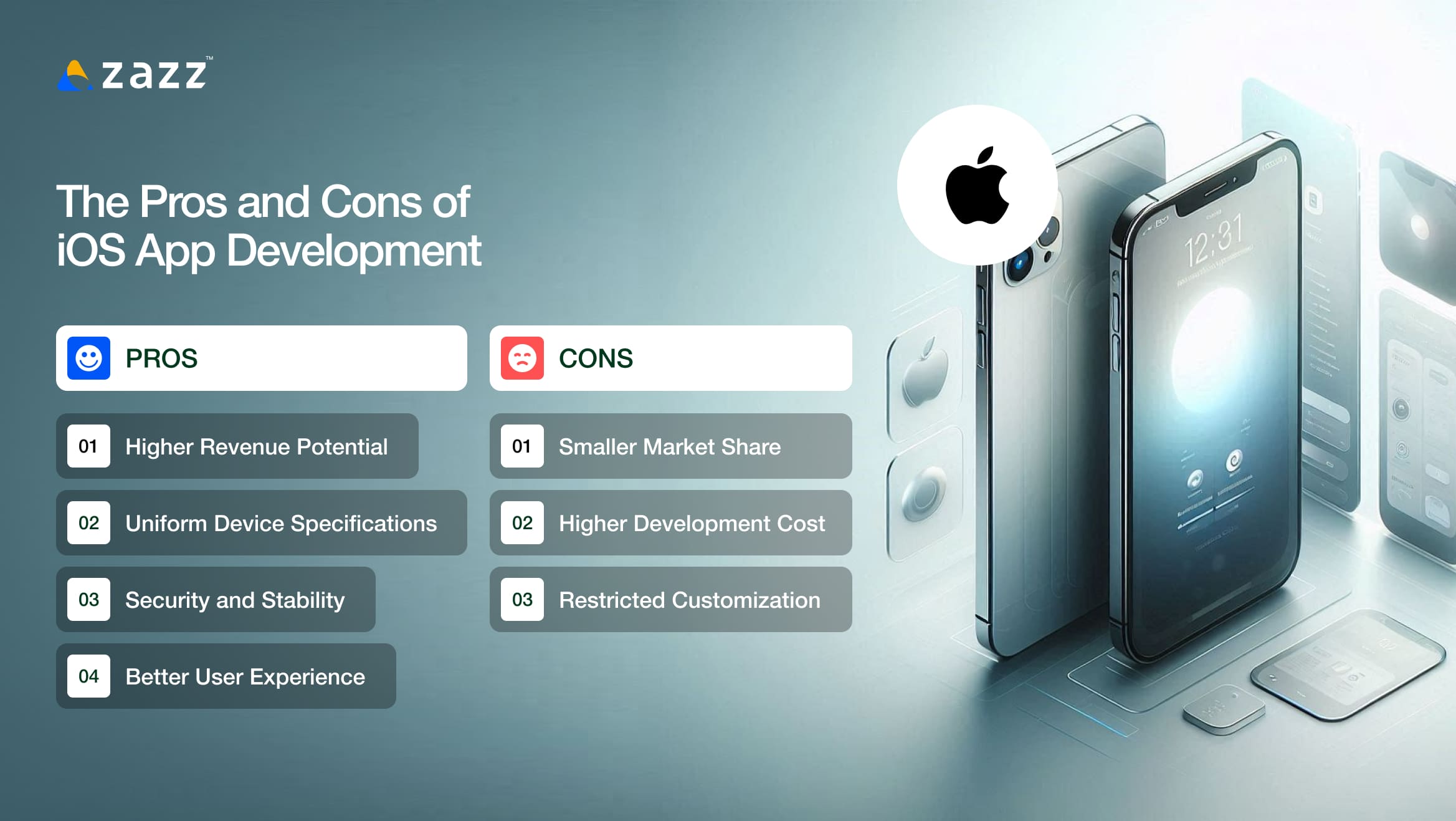
When it comes to mobile app development, the question of Android vs iOS development is a crucial one for businesses, developers, and users alike. Both operating systems dominate the mobile landscape, with Android leading the charge globally in terms of market share, while iOS holds strong, particularly in the U.S. and other premium markets. As a business or developer, deciding between Android development vs iOS development can significantly affect your project’s direction, its features, and its reach.
In this blog, we will explore the key difference between android and iOS app development, features, and factors to consider when comparing Android vs Apple app development, diving deep into Android app development vs iOS app development. We’ll highlight the strengths and weaknesses of each platform, answer some frequently asked questions, and ultimately help you decide which is better-android or iOS development based on your needs.
What is iOS App Development?
iOS app development refers to the process of creating applications for Apple’s mobile operating system, which powers devices like the iPhone, iPad, and iPod Touch. This development process is distinct from other platforms due to Apple’s tightly controlled ecosystem, tools, and guidelines. iOS development typically uses Swift, a powerful and efficient programming language created by Apple, although Objective-C is also used in some cases. The development environment primarily relies on Xcode, Apple’s Integrated Development Environment (IDE).
One of the key aspects of iOS development is its focus on design and user experience (UX). Apple’s Human Interface Guidelines ensure a consistent, polished experience across its devices, making iOS apps widely recognized for their intuitive interfaces and smooth performance. This controlled ecosystem allows for better optimization, security, and higher app quality standards.
Related reading: How Much Does iOS App Development Cost?
What is Android App Development?
Android app development is the process of building applications for the Android operating system, which powers a wide range of devices, including smartphones, tablets, and wearable technology. Android is an open-source platform developed by Google, which gives developers more flexibility and freedom compared to iOS. Java and Kotlin are the primary programming languages for Android development, with Kotlin emerging as the more modern and preferred language. The official IDE for Android development is Android Studio, which provides a comprehensive suite of tools for designing, coding, testing, and debugging Android apps.
Unlike iOS, Android offers more freedom when it comes to customization. Developers can create highly customizable apps tailored to a variety of devices, screen sizes, and hardware configurations. This flexibility allows for greater creativity but may also lead to more complexities in app optimization across the Android ecosystem.
Android app development vs iOS App Development: Key Differences

There are several key differences between android and iOS app development that developers and businesses need to be aware of:
1. Programming Languages and Development Environment
One of the key differences between Android and iOS app development lies in the programming languages used and the development environments.
Android App Development:
Android apps are primarily built using Java or Kotlin. Kotlin, introduced as an official language for Android, is becoming the go-to choice for developers due to its modern syntax and compatibility with existing Java code. Android developers typically use Android Studio, which is Google’s official IDE for building Android apps. Android development offers more flexibility, but that also means it’s easier to develop apps with different quality levels, which could lead to fragmentation.
iOS App Development:
iOS apps are primarily written in Swift, Apple’s programming language, which is known for its performance and ease of use. Swift provides a more consistent and streamlined development process. Xcode, Apple’s IDE, is the go-to tool for iOS app development. With iOS, developers have a more controlled environment and a more standardized set of devices to work with, which can lead to fewer issues related to fragmentation.
In terms of development speed, iOS app development is typically faster for building high-quality, secure applications because of the limited number of devices and screen sizes. On the other hand, Android development offers more customization options, but it also requires more time for optimization across the wide variety of Android devices.
2. User Interface and User Experience (UI/UX)
When discussing Android vs iOS development, user experience is a critical factor. Both platforms offer distinct design philosophies, making Android development vs iOS development differ greatly in terms of UI/UX.
Android UI/UX:
Android allows for more customization, and as a result, apps on Android devices tend to look more varied. While this provides developers with creative freedom, it also leads to potential inconsistencies across different devices. Android apps often use Material Design, which focuses on bold, graphic elements, and fluid transitions. However, the wide variety of screen sizes and hardware specifications can complicate the design process, requiring extra effort to ensure that apps look good on every device.
iOS UI/UX:
iOS provides a more consistent design experience across all devices. Apple follows strict Human Interface Guidelines, which ensures a high standard of design uniformity. iOS apps often have a clean and minimalistic aesthetic. This makes designing apps for iOS much simpler, and iOS developers don’t have to worry about multiple screen resolutions or hardware configurations. iOS is also known for offering smooth transitions and animations, which contribute to its overall user experience.
In Android vs Apple app development, the iOS ecosystem has a clear advantage when it comes to standardization, providing a more polished and cohesive user experience. However, Android’s flexibility allows for more creativity and varied design approaches.
Related reading: Best iOS App Development Programming Languages
3. Market Share and Audience Reach
When it comes to Android vs iPhone development, one of the most important factors to consider is market share and audience reach.
Android Market Share:
Android dominates the global mobile market with a share of around 70% to 75%. The vast variety of Android devices across different price ranges allows developers to target a wide audience, including users from emerging markets. If your goal is to reach as many users as possible, Android app development vs iOS app development is a clear choice.
iOS Market Share:
While iOS has a smaller global market share of around 25% to 30%, it is particularly strong in countries like the U.S., Canada, and many parts of Europe. iOS users tend to have higher disposable income, and apps on the Apple App Store often see more spending on in-app purchases. So, for businesses targeting affluent consumers, iOS app development may be the better choice.
In terms of Android vs Apple app development, the difference in market share and demographics should be a key consideration when deciding which platform to target. If you’re looking for global reach, Android is the better choice. If you’re targeting premium users in specific markets, iOS might be the more lucrative option.
4. App Performance and Security
Security is a critical factor in the Android vs iOS app development debate. While both platforms are constantly improving their security features, there are notable differences.
Android Security:
Android is an open-source platform, which makes it more prone to security risks and malware. While Google provides security patches and updates, they are not always rolled out uniformly across all devices, due to the variety of manufacturers and customizations involved. This makes Android development vs iOS development more challenging when it comes to ensuring app security.
iOS Security:
Apple is known for its strict security measures. With iOS, you have a more controlled ecosystem where updates are consistent across all devices, making it easier to secure apps and protect user data. iOS offers better app review policies, ensuring that only legitimate, high-quality apps are published. For businesses prioritizing security, Android vs iPhone development could be a crucial factor in decision-making.
5. Development Cost and Time
The cost and time to develop an app is another area where Android app development vs iOS app development varies. Due to the more complex nature of Android, development times are generally longer and more costly.
Android Development:
Because of the variety of devices and screen sizes that developers must account for, Android app development tends to take longer and cost more. The flexibility of Android also means that apps may require additional testing and optimization across different devices, which increases both development time and cost.
iOS Development:
iOS apps are typically faster and cheaper to develop. Since there are fewer devices to support and Apple’s strict guidelines ensure uniformity, the development process is more streamlined. This makes Android development vs iOS development a more cost-effective option for businesses looking for faster time-to-market.
6. App Monetization
The monetization strategy is another crucial factor in Android vs iOS app development. Both platforms offer various methods for generating revenue, but their performance differs.
Android App Monetization:
Android apps tend to generate less revenue per user compared to iOS, mainly because Android users are less likely to make in-app purchases. However, Android has a larger user base, which can compensate for the lower monetization potential. Developers can rely on ad-based revenue, in-app purchases, or subscription models.
iOS App Monetization:
iOS users are generally more willing to spend money on apps and in-app purchases. As a result, iOS development tends to have higher revenue potential, especially for premium apps or those targeting a high-income demographic. However, the smaller user base means developers may not reach as many people.
Related reading: Android App Development Cost Breakdown
Pros and Cons: Android app development Vs iOS app development
The Pros and Cons of Android App Development

Like any platform, Android development vs iOS development has its own set of advantages and drawbacks. Here are the pros and cons of developing for Android:
Pros:
- Larger Market Share: Android has a massive global audience, making it easier to reach a broader, more diverse user base.
- Customizability: Android offers greater flexibility for developers to customize apps, especially in terms of UI/UX and device compatibility.
- Cost-Effective: Developing for Android is often cheaper because you can target a wider range of devices, including budget-friendly options.
- Open Source: Android’s open-source nature provides more freedom for customization and access to a wide array of development tools.
Cons:
- Device Fragmentation: With a wide range of Android devices in the market, developers must ensure their apps work across different screen sizes and hardware configurations, making optimization more challenging.
- Security Concerns: Due to Android’s open-source nature, it is more prone to security vulnerabilities, especially when dealing with third-party app stores.
- Longer Development Time: The process of testing and optimizing Android apps for various devices can make development time longer compared to iOS.
The Pros and Cons of iOS App Development

Now, let’s take a look at the pros and cons of iOS app development:
Pros:
- Higher Revenue Potential: iOS users tend to spend more on apps and in-app purchases, making it a lucrative option for businesses aiming to monetize their apps.
- Uniform Device Specifications: Since Apple controls both hardware and software, developers don’t need to worry about device fragmentation, and apps can be optimized for a smaller, more consistent set of devices.
- Security and Stability: iOS is known for its robust security features, including strict app reviews and frequent updates to protect users from malware and data breaches.
- Better User Experience: Apple’s guidelines and focus on high-quality UX design ensure that apps built for iOS tend to be more polished and refined.
Cons:
- Smaller Market Share: While iOS is dominant in premium markets, it has a smaller global market share than Android, limiting potential audience reach.
- Higher Development Cost: Due to Apple’s strict design guidelines and development environment, iOS apps tend to be more expensive to develop.
- Restricted Customization: iOS is a closed ecosystem, meaning developers have fewer opportunities for customization compared to Android.
Android vs. iOS App Development: Which One to Choose?
Choosing between Android development vs iOS development largely depends on your goals, target audience, and business needs. Here are some key questions to consider:
- Audience Reach: If your goal is to reach the widest audience possible, especially in emerging markets, Android development vs iOS development favors Android.
- Revenue Goals: If you’re targeting a more affluent user base and aim for higher monetization, iOS app development might be the better choice due to higher spending on apps and in-app purchases.
- Development Time and Cost: iOS development tends to be faster and more cost-efficient, thanks to a smaller set of devices and a more uniform development environment.
- App Quality and Security: If you prioritize security and app quality, iOS development could be a better option, as Apple’s strict review process ensures that only high-quality, secure apps make it to the App Store.
In conclusion, when deciding between Android app development vs iOS app development, there is no one-size-fits-all answer. Each platform has its strengths and weaknesses, and the decision ultimately depends on your business objectives. By understanding the key differences, pros, and cons of each platform, you can make an informed decision that aligns with your project’s goals and sets you up for success.
Related reading: Programming Languages for Android App Development
Determine the Best Choice with Zazz
At Zazz, we specialize in both Android app development vs iOS app development and can help you determine the best platform for your business. Our team of experienced app developers understands the unique challenges and opportunities each platform presents, allowing us to craft customized solutions tailored to your specific goals.Whether you’re looking to develop for Android, iOS, or both, Zazz provides expert consultation, development, and support to ensure your app is optimized for success. Contact us today to discuss your project and take the first step toward building a high-performing, scalable mobile application.
Frequently Asked Questions
The key differences between Android and iOS app development lie in the programming languages and platforms used. Android apps are primarily built using Java or Kotlin, while iOS apps are developed with Swift or Objective-C. Additionally, Android development focuses on multiple device types with various screen sizes, whereas iOS development is more uniform, as it targets Apple’s specific devices. These distinctions affect everything from app performance to development time and cost.
The choice between Android and iOS largely depends on your target audience and business goals. If you’re targeting a global market with a broad user base, Android may be the way to go due to its larger market share. On the other hand, if you’re focusing on high-income users, iOS might be more beneficial due to its strong presence in premium markets. Our white paper dives deeper into the pros and cons of both platforms to help you make an informed decision.
Generally, iOS app development tends to be more expensive due to Apple’s strict app guidelines and the need for specialized hardware. However, Android development can also be costly because of the variety of devices and screen sizes to accommodate. The cost will also depend on the complexity of the app, the team’s location, and the development timeline. Our white paper offers a detailed breakdown of costs for both platforms to help you plan your budget efficiently.
Yes, Android app development generally takes longer due to the variety of Android devices and screen sizes. iOS, with its more consistent hardware, can be quicker to develop for. However, the overall development timeline depends on the complexity of the app and the development team’s experience. We discuss this in detail in our white paper, outlining strategies to speed up the development process for both platforms.
In the android app development vs iOS app development battle, iOS tends to have higher user engagement and retention, as iPhone users often exhibit loyalty and are more likely to spend money on apps. Android users, on the other hand, have a broader demographic, but user retention can be lower due to the diversity in devices and operating system versions. The choice between Android and iOS should align with your target market’s behavior, which we elaborate on in our white paper.
iOS typically offers a smoother process for app updates and maintenance, thanks to Apple’s controlled environment and the uniformity of its devices. Android requires more frequent updates due to the variety of devices and manufacturers, which can lead to fragmented user experiences. Our white paper outlines best practices for maintaining apps on both platforms and keeping them up-to-date efficiently.
Recent Articles
Table of Content 1. What is the Carnival in Brazil?...
Table of Content 1. What is IT Staff Augmentation? 2....
Table of Content 1. What is Staff Augmentation for App...












